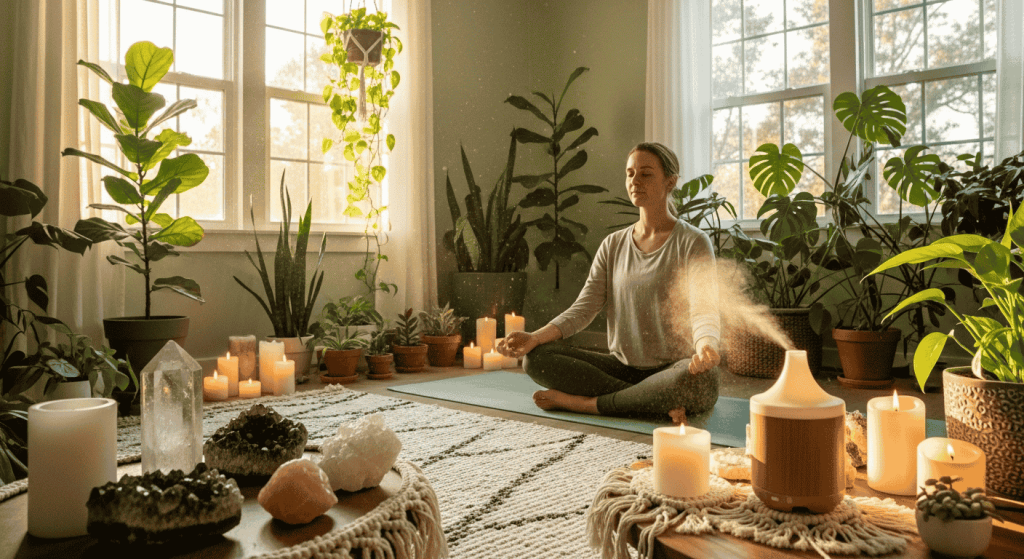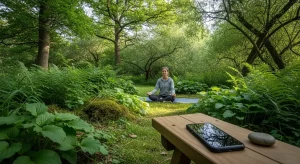In today’s fast-paced world, finding balance and inner peace has become more crucial than ever. Holistic self-care practices are trending in 2025, focusing on integrating mind, body, and spirit through comprehensive wellness approaches. This complete guide will explore transformative holistic self-care and relaxation practices that can revolutionize your daily routine and enhance your overall well-being.
Understanding Holistic Self-Care: A Mind-Body-Spirit Approach
Holistic self-care goes beyond traditional wellness methods by addressing your entire being. Unlike quick fixes or surface-level solutions, holistic wellness practices recognize the interconnectedness of your physical, mental, emotional, and spiritual health. The focus in 2025 is on blending science-backed solutions with holistic wellness to create a balanced, rejuvenating approach to health.
Immune-Boosting Nutrition Trends
Key Benefits of Holistic Self-Care:
- Reduced stress and anxiety levels
- Improved sleep quality and energy
- Enhanced emotional regulation
- Stronger immune system function
- Greater life satisfaction and purpose
- Better relationships and social connections
Essential Relaxation Techniques for Daily Practice
1. Mindfulness Meditation for Stress Relief
Mindfulness meditation and deep breathing exercises are widely adopted stress management techniques. Regular mindfulness practice helps you stay present, reduce racing thoughts, and develop emotional resilience.
How to Practice Mindful Meditation:
- Find a quiet, comfortable space
- Sit with your spine straight and shoulders relaxed
- Focus on your natural breathing pattern
- When thoughts arise, gently return attention to your breath
- Start with 5-10 minutes daily and gradually increase
Mindfulness & Meditation Apps to Reduce Stress
2. Progressive Muscle Relaxation
This powerful relaxation technique involves systematically tensing and releasing muscle groups throughout your body. Progressive muscle relaxation helps identify areas of tension while promoting deep physical and mental relaxation.
Step-by-Step Process:
- Begin with your toes and work upward
- Tense each muscle group for 5 seconds
- Release tension completely and notice the contrast
- Focus on the sensation of relaxation
- Complete the sequence within 15-20 minutes
3. Deep Breathing Exercises
Controlled breathing activates your parasympathetic nervous system, triggering your body’s natural relaxation response. These wellness practices can be performed anywhere and provide immediate stress relief.
Popular Breathing Techniques:
- 4-7-8 Breathing: Inhale for 4 counts, hold for 7, exhale for 8
- Box Breathing: Equal counts for inhaling, holding, exhaling, and holding
- Diaphragmatic Breathing: Deep belly breathing to maximize oxygen intake
Creating Your Holistic Wellness Routine
Morning Rituals for Mind-Body Balance
Starting your day with intentional holistic self-care practices sets a positive tone and builds resilience for daily challenges.
Essential Morning Elements:
- Gentle Movement: Yoga and stretching practices integrate physical fitness with stress reduction and emotional balance
- Gratitude Practice: Write three things you’re grateful for
- Mindful Hydration: Drink water slowly and mindfully
- Intention Setting: Establish your focus for the day
Best Healthy Snacks to Keep You Energized All Day
Evening Wind-Down Practices
Creating a consistent wind-down routine improves sleep quality, which supports better meditation and overall wellness.
Relaxation Techniques for Better Sleep:
- Dim lights 1-2 hours before bedtime
- Practice gentle yoga or stretching
- Use aromatherapy with lavender or chamomile
- Journal your thoughts and feelings
- Listen to calming music or nature sounds
Advanced Holistic Self-Care Methods
Energy Healing and Alternative Therapies
Energy healing practices like Reiki are becoming increasingly popular as part of holistic self-care routines. These alternative approaches work with your body’s energy systems to promote healing and balance.
Popular Energy Healing Practices:
- Reiki for energy balancing
- Acupuncture for physical and emotional healing
- Crystal therapy for chakra alignment
- Sound healing with singing bowls or tuning forks
How Drinking Enough Water Can Transform Your Health
Nature-Based Wellness Activities
Connecting with nature provides powerful benefits for both mental and physical health. Outdoor holistic self-care practices help reduce cortisol levels, boost vitamin D production, and enhance mood naturally.
Nature-Centered Activities:
- Forest bathing (Shinrin-yoku)
- Beach or lake meditation
- Gardening for grounding
- Hiking with mindful awareness
- Outdoor yoga practice
Nutrition and Holistic Wellness
Mindful Eating Practices
Your relationship with food significantly impacts your overall well-being. Mindful eating transforms meals into opportunities for nourishment and self-care.
Mindful Eating Principles:
- Eat without distractions (TV, phone, computer)
- Chew slowly and savor flavors
- Listen to hunger and fullness cues
- Choose nutrient-dense, whole foods
- Practice gratitude for your meals
Hydration as Self-Care
Proper hydration supports every system in your body. Make water consumption a mindful practice by choosing quality sources, using beautiful containers, and drinking with intention.
Sustainable Fashion Brands to Watch
Building Sustainable Wellness Habits
The 1% Rule for Holistic Self-Care
Small, consistent improvements create lasting transformation. Focus on making your holistic wellness practices just 1% better each day rather than attempting dramatic overhauls.
Implementation Strategies:
- Start with one practice and master it
- Use habit stacking to link new practices to existing routines
- Track your progress without judgment
- Celebrate small victories
- Adjust practices based on your evolving needs
Creating Your Personal Sanctuary
Designate a specific space in your home for relaxation techniques and mindfulness meditation. This physical environment reinforces your commitment to holistic self-care.
Sanctuary Elements:
- Comfortable seating or cushions
- Natural lighting or soft lamps
- Plants or natural elements
- Inspiring books or journals
- Essential oils or incense
- Meaningful objects or artwork
37 Hidden Gems in London Only Locals Know
Overcoming Common Challenges
Time Constraints
Many people believe holistic self-care requires hours of daily practice. However, even five minutes of mindful breathing or gratitude practice can create meaningful benefits.
Quick Self-Care Solutions:
- 2-minute breathing exercises between meetings
- Walking meditation during lunch breaks
- Mindful transitions between activities
- Gratitude practice during commute
- Stretching while watching TV
Consistency Issues
Building sustainable wellness practices requires patience and self-compassion. Focus on progress, not perfection, and remember that every small step contributes to your overall well-being.
Most Underrated Islands in Europe – Peaceful Escape Guide
FAQ: Holistic Self-Care and Relaxation Practices
What are the most effective holistic self-care practices for beginners?
Start with simple mindfulness meditation, deep breathing exercises, and gratitude journaling. These foundational wellness practices require no special equipment and can be practiced anywhere. Begin with 5-10 minutes daily and gradually expand your routine as these habits become natural.
How long does it take to see benefits from relaxation techniques?
Many people experience immediate benefits from relaxation techniques like deep breathing and progressive muscle relaxation. However, cumulative benefits from consistent holistic self-care practices typically become noticeable within 2-4 weeks of regular practice. Long-term transformation occurs over months and years of dedicated wellness habits.
Can holistic self-care practices replace traditional medical treatment?
Holistic wellness practices are complementary to, not replacements for, professional medical care. While these techniques can significantly improve your quality of life and support healing, always consult healthcare providers for serious physical or mental health concerns. The best approach combines traditional medicine with holistic self-care methods.
What’s the difference between self-care and holistic self-care?
Traditional self-care often focuses on single activities like bubble baths or shopping trips. Holistic self-care takes a comprehensive approach, addressing your physical, mental, emotional, and spiritual needs simultaneously. This integrated method creates deeper, more lasting wellness benefits by recognizing the interconnection of all aspects of your well-being.
How do I maintain motivation for daily wellness practices?
Connect your holistic self-care practices to your deeper values and life goals. Track how these activities make you feel rather than just checking off completed tasks. Start small, celebrate progress, and remember that self-care is an investment in your ability to show up fully for yourself and others.
10 Hidden Gems in England You Need to Visit Beyond London
Transform Your Life Today
Holistic self-care and relaxation practices offer a path to deeper well-being, greater resilience, and enhanced life satisfaction. By integrating mind-body wellness approaches into your daily routine, you create a foundation for lasting health and happiness.
Remember, your wellness journey is unique. Experiment with different relaxation techniques and mindfulness practices to discover what resonates most deeply with you. Small, consistent steps toward holistic wellness create profound transformations over time.
Ready to begin your holistic wellness transformation? Discover premium self-care products and guided meditation resources that support your journey toward complete well-being. to explore curated wellness tools designed for your holistic self-care practice.










